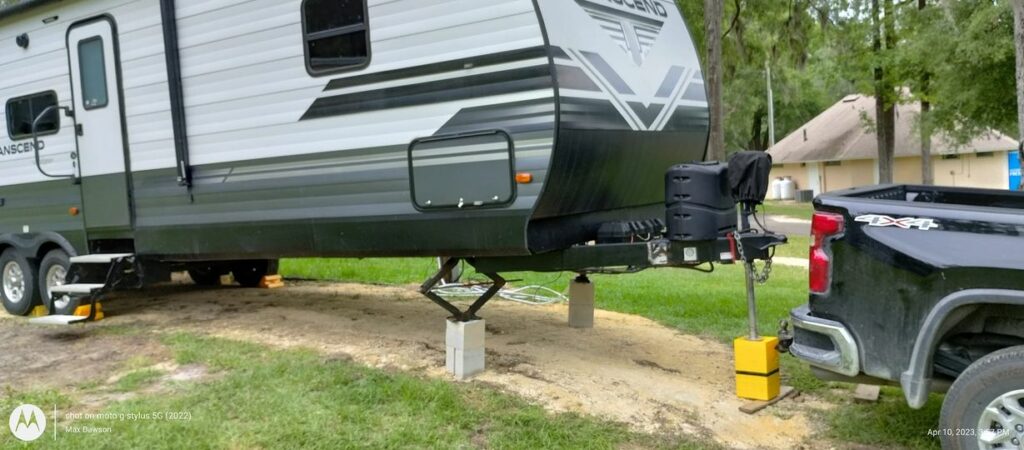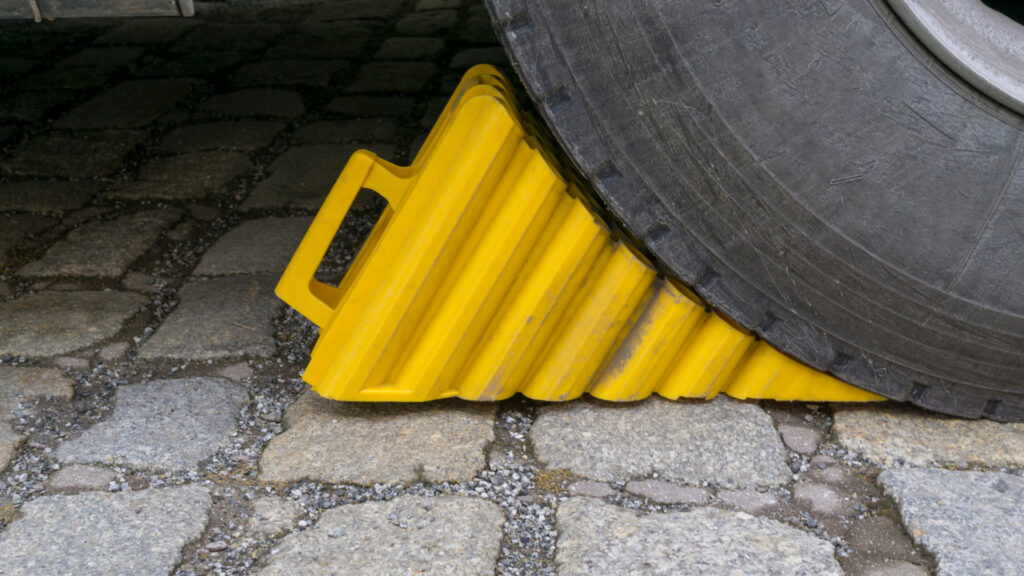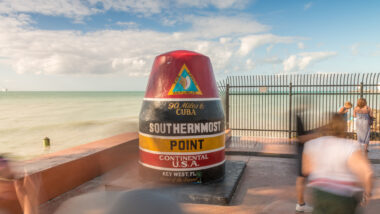Table of Contents Show
In recent years, the popularity of RVs has grown exponentially.
Unfortunately, with this increase in RV travel, there has also been a rise in incidents where owners park their rigs in risky situations. This was the case for one owner who recently found themselves at the center of a social media storm.
The individual posted pictures of their rig parked at a campsite. The post ignited a firestorm of criticism in the community. It led to a heated discussion about safety and the potential dangers.
Want to stay safe and avoid putting yourself and your RV in danger? Keep reading!
Facebook Erupts Over Unsafe RV Parking
When one full-time RVer arrived at his site, he knew it didn’t look good.
The campsite had a steep incline from front to back. As a result, it pushed his leveling and stabilizer jacks to the max. Unfortunately, the surrounding sites didn’t look much better.
When the user struggled to make the site work, others in the campground chimed in with some advice. However, as the pictures indicate, the solutions weren’t ideal either. The tongue jack sat on a large stack of leveling blocks.
Additionally, the stabilizer jacks required cinder blocks under them to reach the ground. The sketchy parking job looked anything but safe.
The post attracted more than 330 comments before a moderator turned off commenting. The situation was a disaster waiting to happen and far from safe. Luckily, the trailer didn’t stay this way for long.

RVer Finds Safety in Another Spot
After taking a substantial amount of heat, the user returned to report that the campground instructed him to park that way. However, he didn’t keep it there. He didn’t feel safe, and they moved to a site that better fit their rig.
However, the post generated quite a stir amongst the group. People were upset that anyone would park their rig so unsafely.
Many shared how one false move could have created a very chaotic situation. Luckily, the RVer and his rig survived the encounter and safely finished their trip.
RV Parking Mistakes to Avoid
The post serves as a reminder of some mistakes you should avoid. If not, you could find yourself in a risky situation. For us, the risks aren’t worth it. Avoid these common RV parking mistakes if you want smooth RVing adventures.
Parking on Soft Ground
While it may seem convenient to park your camper on a patch of soft grass or dirt, doing so can be dangerous. Soft or muddy ground can cause your trailer to sink. You can damage your vehicle and find yourself stranded.
Always look for firm, level ground to park on to avoid this mistake. If you’re unsure about the stability of the campsite, use blocks or pads under your RV’s tires to provide additional support.
Avoid parking on steep slopes or near water, as these areas are more prone to soft ground and other hazards.
Extending Jacks Too Far
RV jacks level and stabilize your vehicle. However, they can only do so much. Extending your jacks too far can damage them, your camper frame, or both. You should always follow the manufacturer’s guidelines for using your jacks.
Many owners use plastic or wood blocks under them. These can help to reduce the distance between the ground and the jacks.
The further you extend your jacks, the more unstable your rig will feel. If you want a solid foundation, limit how far you extend each of your jacks as much as possible.
Parking Too Close to Obstacles
Avoid parking your camper too close to obstacles such as trees, boulders, or other campsite hazards. Parking too close to obstacles can damage your trailer and make maneuvering in and out difficult.
To avoid this mistake, always take the time to carefully survey your surroundings before parking your RV. Look for any potential obstacles, and ensure you have enough clearance on all sides. Look for picnic tables, electrical boxes, or fire rings.
When parking your RV, have a spotter help guide you into your parking space. Use your mirrors and backup camera to monitor your surroundings, and take it slow to avoid collisions or other mishaps.
Not Using Wheel Chocks
Wheel chocks are simple devices that help keep your rig from rolling or shifting while parked. They’re critical when parking on an incline or uneven surface.
If you don’t use wheel chocks, your camper could roll or shift, causing damage to your vehicle or putting you and your passengers at risk. In extreme cases, your RV could even roll away and cause damage or injury to others.
To avoid this mistake, always use wheel chocks when parking your camper. Place them on both sides of each wheel to prevent any movement.
Don’t try to save money by purchasing cheap plastic chocks. Spend a few extra pennies and get a set of solid rubber chocks so you have confidence in them.

Underestimating Your Size
Underestimating the size of your RV is a common mistake that can lead to accidents. Campers are larger and heavier than most other vehicles on the road. It’s essential to know your RV’s weight and measurements.
Underestimating your size can lead to problems such as parking in too small spaces, hitting low overhangs, or colliding with other vehicles or objects. To avoid this mistake, drive your rig across a Cat Scale and measure your trailer when hitched to the tow vehicle.
If you’re new to driving a camper, practice your parking and maneuvering skills. Head to an empty parking lot for some practice before hitting the road.
This can allow you to get a feel for your RV’s size and handling. You can also build your confidence behind the wheel.
Pro Tip: Not sure which RV is right for you? Here’s How To Determine The Best RV Size For Your Needs
Not Leveling Your RV
Parking your RV on uneven ground can cause discomfort while you’re inside and can even lead to damage.
When unlevel, your refrigerator and other appliances may not work properly, your slide-outs may not function correctly, and it can unevenly distribute the weight of your camper. This puts unnecessary strain on its suspension system and other components.
To avoid this mistake, always level your rig when you park it. Use leveling blocks, hydraulic jacks, or other systems to ensure your camper remains stable and comfortable.
Check the level of your trailer side-to-side and front-to-back, and adjust as necessary until it’s perfectly level.

Using Stabilizer Jacks for Lifting
Stabilizer jacks prevent wobbling and reduce movement while parked. They’re not strong enough to lift or help with leveling.
Using them for this can cause permanent damage to them and your frame. This can be expensive to repair and put you and your passengers at risk of injury.
Always use the appropriate jacks to lift your RV. Ensure you use jacks designed for lifting and follow the manufacturer’s guidelines for using them safely.
Before lifting your camper, ensure you’ve parked on firm, level ground and have enough clearance on all sides.
Keep in Mind: Before you purchase just any RV jack, take a look at this list of the best RV leveling jacks and RV stabilizer jacks!
Park Your RV Safely and Avoid Backlash
When parking your RV, mistakes can lead to damage, accidents, and injuries. However, being mindful of your surroundings and taking your time can help ensure a safe and enjoyable camping experience.
Taking a few precautions and being aware of potential hazards can help avoid backlash and ensure a safe and enjoyable RVing experience.
Have you ever faced backlash online for RVing mistakes?






